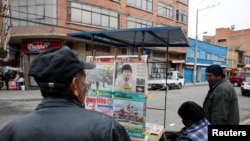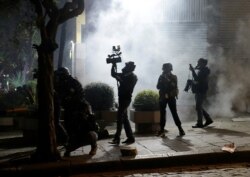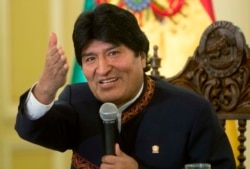Protests have roiled Bolivia for about three weeks, leading to the ouster of Evo Morales as president.
Increasingly, journalists are becoming targets of harassment, censorship and personal attacks by citizens from across the political spectrum, as well as the government. Some newspapers have suspended printing, and broadcast news outlets have gone dark, creating confusion and misinformation.
According to the National Press Association in Bolivia, violence against journalists stems from political instability, among other reasons. However, public distrust of reporters has existed for years.
The association has registered 64 attacks on journalists and 12 on media outlets this year in the cities of La Paz, El Alto, Oruro, Cochabamba and Santa Cruz.
The newspaper Los Tiempos in Cochabamba said it decided to cancel its paper edition after its journalists were constantly threatened.
"Due to threats of attacks and looting by groups related to the Socialist Movement against Los Tiempos, the print edition will not circulate tomorrow. We will keep our readers informed through our website and official social media accounts. Thank you for your understanding," a statement said.
'Victims of aggression'
Since disputed presidential elections in October and the resignation of Morales — currently in exile in Mexico — Bolivia is in a restive state. Daily clashes between supporters and opponents of Morales have made work difficult for journalists.
"We have deeply regretted the fact that … journalists, reporters, cameramen in Bolivia, have become victims of aggression," stated Frank Chavez, executive director of the National Press Association.
State news outlets such as Bolivia TV and Radio Patria have stopped broadcasting regular programming since Nov. 9, due to the constant threats of people opposed to former President Morales.
In one reported incident, hundreds of people protested outside a state-run radio station and forced 40 employees to leave the building. Station director Jose Aramayo was tied to a tree after hundreds of people forcibly removed him.
International organizations such as the Committee to Protect Journalists, or CPJ, are expressing concern over reports of physical attacks against journalists from protesters and government forces.
"We have seen incidents by the police assaulting journalists, also of the protesters preventing journalists from entering a place, or shouting at journalists, telling them that they are liars, that they will not cover events with objectivity," Natalie Southwick, coordinator for Central and South America at CPJ, told Voice of America.
"There is a very worrying possibility of self-censorship that journalists are not going to report on certain communities or certain issues out of fear."
One reporter's experience
Miriam Jemio has worked as a reporter in Bolivia for more than 25 years. She told VOA that recently, for the first time ever, she was attacked while doing her work.
"I was on my way to an event with former President Evo Morales before his resignation and there was a group of protesters on the street. I took my camera and started recording, and when I was getting closer to the group a woman told me not to record and asked me to give her my phone."
Jemio said the protesters started pushing her, broke her selfie stick and almost stole her phone until another person told the group to stop.
"They are equally aggressive on both sides. The worst thing is that they tell us from both sides that we are infiltrators and liars."
She said that every day she covers a story or tries to do an interview, she encounters people who don't trust her work. Yet, despite these challenges, Jemio said she still thinks it's possible — though increasingly difficult — to do her job.






